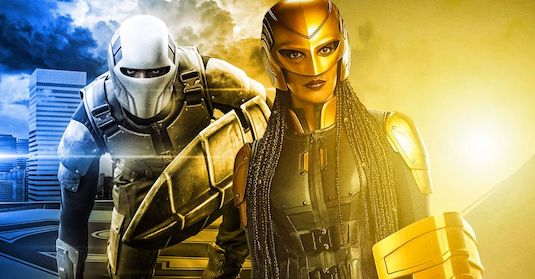The Media Research Center loves to hate-watch “Supergirl,” whining about its insistence on working the issues of people who aren’t white heterosexuals into its superhero plots. It’s a new TV season now, and with original hate-watcher Lindsay Kornick having moved on to spread her bias at Fox News, Karen Townsend was stuck hate-watching the show for a Sept. 21 post:
It must be white guilt week for network television shows as the fall season gets underway. Even in the world of superheroes, the white characters are taken to task for not being woke enough for their black counterparts. The struggle is real.
In the episode of The CW’s Supergirl titled “Blind Spots,” which aired on September 21, the newest superhero, Guardian, realizes it is time to step up and protect victims who “look like” her. Kelly Olsen (Azie Tesfai) is overwhelmed when a low-income housing development suffers from an explosion and collapses to the ground. Many residents suffer injuries and breathing difficulties from the dust and debris, including a young boy she has taken under her wing.
Kelly finds it difficult to get Supergirl and the others interested in her fight on behalf of the residents as they are hospitalized. The white city councilwoman who represents the housing project is also injured at the scene but she is able to use extortion to obtain a very expensive experimental drug to heal quickly. She threatens to pull the grants the hospital is in line to receive if she isn’t given the drug. She’s an evil character as she considers the building collapse to be a gift. Now she doesn’t have to be bothered by low-income housing and she can provide high-tech companies with more office space when the area is rebuilt. She is gentrifying the neighborhood.
Kelly confronts her superhero friends and they quickly apologize for their lack of awareness of the plight of black Americans.
[…]At the end of the show, there is a scene where Kelly is relaxing at home after her very long day fighting racial injustice. She is wearing a t-shirt with the text “Say her name” on the front. On the back is the word “Justice”. This is something that Black Lives Matter activists say at rallies. On her coffee table are two books. One is Robin DiAngelo’s “White Fragility” and the other is Ta-Nehisi Coates’ “Between the World and Me”.
Supergirl has a long liberal history. With each season the stories have become more so. The addition of Guardian, a black lesbian female superhero, is the latest character in charge of virtual-signaling the audience. She is coming on strong this season.
Being a right-wing “media researcher” who gets paid to hate-watch TV shows means never having to apologize for anything, apparently.
